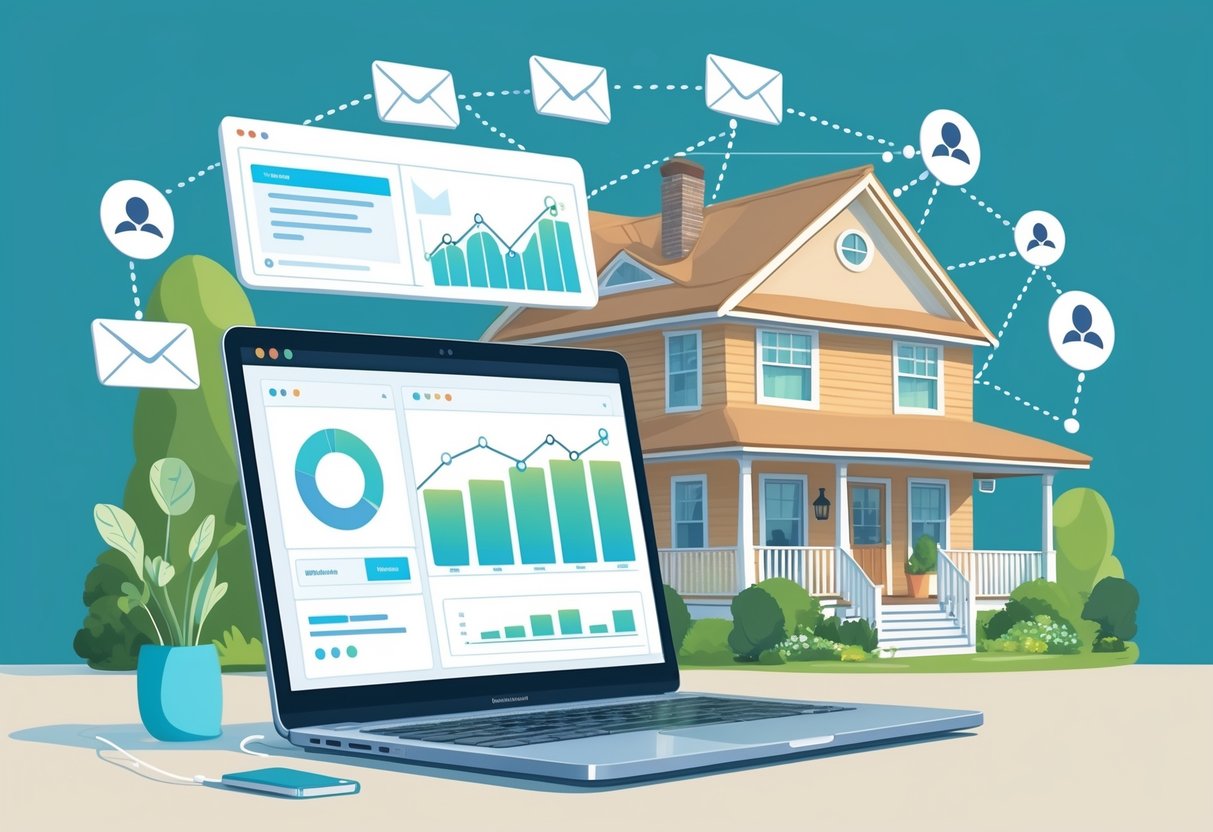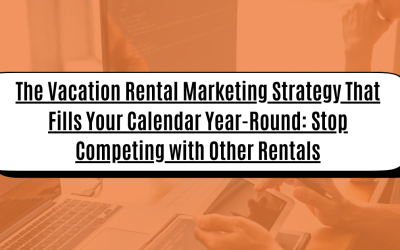Many short-term rental hosts struggle to move beyond relying on large online travel agencies. Email marketing offers a way to build direct connections with guests and control those relationships. This channel allows hosts to engage with potential and past guests, making their business more valuable and less dependent on costly third-party platforms.
Creating a strong email list starts with offering something useful to potential guests, like insider guides or fun quizzes. Using customer data to tailor messages helps hosts stay relevant and build trust. Managing these contacts with a good system allows for personalized communication, which can improve guest engagement and bookings over time.
Key Takeaways
- Building direct guest relationships through email increases business value.
- Offering useful content helps capture and grow an email list.
- Personalizing emails with guest data boosts engagement and bookings.
The Value of Email Marketing for Short-Term Rental Hosts
Moving Beyond Online Travel Agencies
Many short-term rental hosts rely heavily on OTAs for bookings. Email marketing helps hosts reduce this dependence by creating a direct channel to guests. Through email, hosts can build trust and communicate personal offers without paying OTA fees. This shift allows hosts to control guest interactions and improve booking predictability.
Controlling Guest Communication
Owning the guest relationship means having direct access to potential and past guests. Email lists act as valuable assets where hosts can nurture leads with useful content like insider guides or quizzes. This approach encourages guests to stay engaged without immediate sales pressure. Using tools like CRMs, hosts can organize guest information to personalize messages based on interests and booking history.
Increasing Business Strength
Having a strong email marketing system makes the short-term rental business more valuable. A well-maintained email list provides a reliable source of future bookings and opportunities to build long-term relationships. Automated email sequences targeted by guest type or preferences can improve conversion rates. This stability and control enhance overall business success.
Building a High-Quality Email List
Capturing Potential Guests
Capturing email leads is a straightforward process that focuses on offering something valuable in exchange for contact information. Hosts can use simple tools like pop-ups or forms to gather emails, but the key is to give potential guests a reason to subscribe. This can be done through quizzes, insider guides, or other useful content related to the destination. The goal is to start a relationship based on trust and interest before making any sales offers.
Creating Attractive Offers
Effective lead magnets are digital or physical assets that encourage visitors to join an email list. Examples include local guides, checklists, or quizzes that reveal interesting details about the area or the guest’s preferences. These tools appeal to the guest’s desire to explore the destination more deeply and provide a reason to stay connected beyond just a simple newsletter. Using creative and relevant content increases the chance visitors will share their emails.
Rewards Beyond Newsletters
Offering incentives outside of traditional newsletters can help grow the email list faster. This might include exclusive discounts, early access to deals, or special information about local events. The idea is to show value through ongoing communication and to avoid overwhelming guests with sales pitches. Building trust and providing useful updates help maintain engagement and encourage guests to take action in the future.
Building Guest Confidence and Connection
Navigating Trust Challenges with OTAs
Guests often rely on OTAs because they feel protected booking through them. Hosts must work hard to gain this trust independently. Email marketing is a direct way to connect and build credibility with guests. By owning the communication channel, hosts can overcome the OTA trust barrier and create solid guest relationships.
Creating Strong, Ongoing Guest Bonds
Capturing guest emails is the first step to building lasting relationships. Offering valuable content like insider destination guides or fun quizzes helps attract potential guests. Keeping guests engaged with useful and relevant information, not just sales pitches, strengthens the connection over time.
Maintaining Reliable Guest Value
Consistency matters in email marketing. Hosts should customize messages using stored guest information to send relevant offers and updates. Tools like CRMs help organize guest details, enabling personalized communication. Providing timely and tailored emails keeps guests interested and more likely to book again.
Leveraging CRM for Personalized Communication
Grasping Customer Relationship Management
A Customer Relationship Management (CRM) system is a tool that stores guest information to help hosts manage their email marketing. It lets hosts keep details about their guests, like stay dates, preferences, and interests. This info is key to creating email messages that feel personal and relevant, which builds a stronger guest connection.
Adding Value to Guest Information
Collecting guest data goes beyond just names and emails. Hosts can gather insights through special offers, quizzes, or insider guides about the area. This helps reveal what interests guests the most. With this added detail, email content can be tailored to match guest needs and their stage in the booking process.
Organizing Guests with Tags and Groups
Tagging guests in a CRM means labeling them based on interests or actions, like downloading a guide or visiting during summer. These tags help sort guests into groups for targeted emails. Clear classification allows automated emails to speak directly to each guest’s preferences, making communication more effective and helpful.
Email Automation and Segmentation Best Practices
Customized Email Plans
Creating personalized email sequences is essential. Hosts should collect guest data and use it to send messages that match each guest’s interests and past behavior. Automation tools help deliver emails at the right time, making communication feel timely and relevant. Instead of pushing sales right away, the focus should be on providing useful information first to build trust.
Segmenting Based on Guest Interest
Segmenting email lists by guest intent improves engagement. Tags from lead magnets like destination guides help identify what each guest cares about. Using this data, hosts can send targeted emails to groups interested in family activities, local events, or other specific offerings. This focused approach raises the chance guests will act on the emails.
Steering Clear of One-Size-Fits-All Messages
Sending generic emails to everyone reduces impact. Guests expect content that feels relevant to them. Using broad, identical messages too often can lead to lower open rates and less interest. Email campaigns should avoid the standard newsletter style and instead deliver targeted value that connects to the guest’s preferences and needs.
Showcasing Local Expertise for Increased Bookings
Using Insider Resources to Attract Guests
Offering insider guides can be an effective way to capture potential guests’ emails. These guides focus on hidden gems, local tips, and unique experiences in the area. By sharing valuable information, hosts give visitors a reason to connect and stay informed.
Examples of insider resources:
- Neighborhood highlights
- Best restaurants and shops
- Seasonal events and activities
This approach helps guests feel more connected to the destination before they even book.
Emphasizing Community Participation
Hosts build trust and credibility by showing their involvement in the local community. Sharing updates about efforts to improve the area or support local causes shows guests that the host cares. This connection can make guests more comfortable and willing to book.
Community engagement can include:
- Supporting environmental projects
- Sponsoring local events
- Collaborating with area businesses
Being seen as a positive community member strengthens the host’s reputation.
Linking Guests to Authentic Local Experiences
Helping guests discover genuine local experiences enhances their stay. Hosts who recommend activities, tours, or cultural spots provide real value. Personalizing these recommendations based on guest interests can increase bookings.
Ways to connect guests with local life:
- Curated activity lists
- Tailored event invitations
- Specialized interest suggestions (family-friendly, outdoor, food tours)
Providing these connections turns a regular booking into a memorable visit.
Choosing Effective Email Marketing Software
Suggested Email Platforms
Choosing the right platform is important for managing your email marketing. Platforms like Klaviyo and GoHighLevel offer tools to organize contacts, automate emails, and tag guests based on their interests. These features help hosts stay connected with guests and send messages that matter to each person.
| Platform | Features | Benefits |
|---|---|---|
| Klaviyo | Contact segmentation, automation | Easy targeting and personalization |
| GoHighLevel | CRM integration, workflows | Combines marketing and sales tools |
| STR Booster | Tailored for short-term rentals | Focused on guest tagging and engagement |
Using these platforms helps hosts build better relationships and control guest communication without relying on outside services.
Using CRM Systems with Automation
A CRM (Customer Relationship Management) stores guest data like stay history, preferences, and interests. Tagging guests in the CRM lets hosts send tailored emails based on specific information. Automation tools use this data to deliver messages at the right time, such as family activity updates for guests who stayed with kids.
Automation sequences nurture guests by sharing useful content first, then soft-selling offers later. This approach builds trust over time. A well-organized CRM combined with automation leads to better engagement, more bookings, and a stronger connection to the local area.





0 Comments